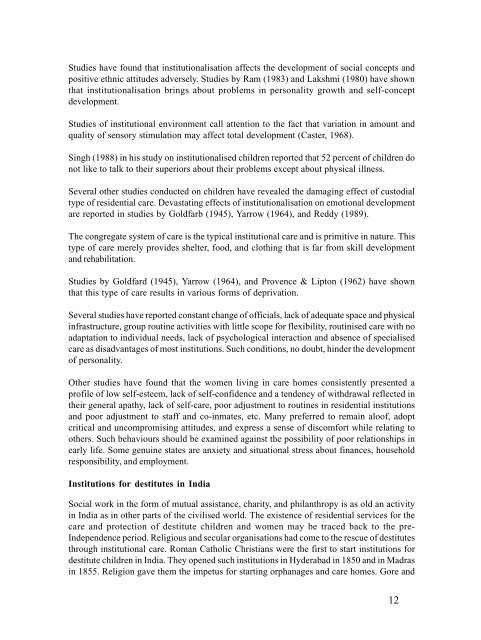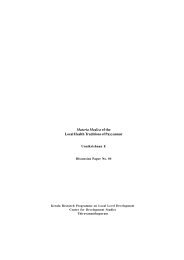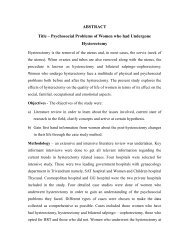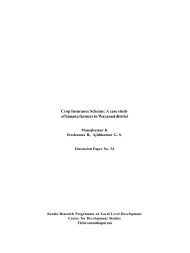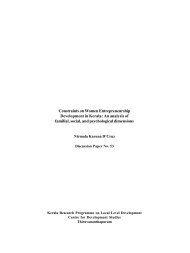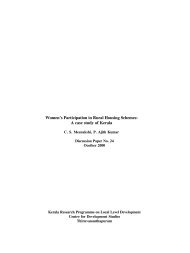Destitute Women in Kerala: Psychological resources and psycho ...
Destitute Women in Kerala: Psychological resources and psycho ...
Destitute Women in Kerala: Psychological resources and psycho ...
Create successful ePaper yourself
Turn your PDF publications into a flip-book with our unique Google optimized e-Paper software.
Studies have found that <strong>in</strong>stitutionalisation affects the development of social concepts <strong>and</strong><br />
positive ethnic attitudes adversely. Studies by Ram (1983) <strong>and</strong> Lakshmi (1980) have shown<br />
that <strong>in</strong>stitutionalisation br<strong>in</strong>gs about problems <strong>in</strong> personality growth <strong>and</strong> self-concept<br />
development.<br />
Studies of <strong>in</strong>stitutional environment call attention to the fact that variation <strong>in</strong> amount <strong>and</strong><br />
quality of sensory stimulation may affect total development (Caster, 1968).<br />
S<strong>in</strong>gh (1988) <strong>in</strong> his study on <strong>in</strong>stitutionalised children reported that 52 percent of children do<br />
not like to talk to their superiors about their problems except about physical illness.<br />
Several other studies conducted on children have revealed the damag<strong>in</strong>g effect of custodial<br />
type of residential care. Devastat<strong>in</strong>g effects of <strong>in</strong>stitutionalisation on emotional development<br />
are reported <strong>in</strong> studies by Goldfarb (1945), Yarrow (1964), <strong>and</strong> Reddy (1989).<br />
The congregate system of care is the typical <strong>in</strong>stitutional care <strong>and</strong> is primitive <strong>in</strong> nature. This<br />
type of care merely provides shelter, food, <strong>and</strong> cloth<strong>in</strong>g that is far from skill development<br />
<strong>and</strong> rehabilitation.<br />
Studies by Goldfard (1945), Yarrow (1964), <strong>and</strong> Provence & Lipton (1962) have shown<br />
that this type of care results <strong>in</strong> various forms of deprivation.<br />
Several studies have reported constant change of officials, lack of adequate space <strong>and</strong> physical<br />
<strong>in</strong>frastructure, group rout<strong>in</strong>e activities with little scope for flexibility, rout<strong>in</strong>ised care with no<br />
adaptation to <strong>in</strong>dividual needs, lack of <strong>psycho</strong>logical <strong>in</strong>teraction <strong>and</strong> absence of specialised<br />
care as disadvantages of most <strong>in</strong>stitutions. Such conditions, no doubt, h<strong>in</strong>der the development<br />
of personality.<br />
Other studies have found that the women liv<strong>in</strong>g <strong>in</strong> care homes consistently presented a<br />
profile of low self-esteem, lack of self-confidence <strong>and</strong> a tendency of withdrawal reflected <strong>in</strong><br />
their general apathy, lack of self-care, poor adjustment to rout<strong>in</strong>es <strong>in</strong> residential <strong>in</strong>stitutions<br />
<strong>and</strong> poor adjustment to staff <strong>and</strong> co-<strong>in</strong>mates, etc. Many preferred to rema<strong>in</strong> aloof, adopt<br />
critical <strong>and</strong> uncompromis<strong>in</strong>g attitudes, <strong>and</strong> express a sense of discomfort while relat<strong>in</strong>g to<br />
others. Such behaviours should be exam<strong>in</strong>ed aga<strong>in</strong>st the possibility of poor relationships <strong>in</strong><br />
early life. Some genu<strong>in</strong>e states are anxiety <strong>and</strong> situational stress about f<strong>in</strong>ances, household<br />
responsibility, <strong>and</strong> employment.<br />
Institutions for destitutes <strong>in</strong> India<br />
Social work <strong>in</strong> the form of mutual assistance, charity, <strong>and</strong> philanthropy is as old an activity<br />
<strong>in</strong> India as <strong>in</strong> other parts of the civilised world. The existence of residential services for the<br />
care <strong>and</strong> protection of destitute children <strong>and</strong> women may be traced back to the pre-<br />
Independence period. Religious <strong>and</strong> secular organisations had come to the rescue of destitutes<br />
through <strong>in</strong>stitutional care. Roman Catholic Christians were the first to start <strong>in</strong>stitutions for<br />
destitute children <strong>in</strong> India. They opened such <strong>in</strong>stitutions <strong>in</strong> Hyderabad <strong>in</strong> 1850 <strong>and</strong> <strong>in</strong> Madras<br />
<strong>in</strong> 1855. Religion gave them the impetus for start<strong>in</strong>g orphanages <strong>and</strong> care homes. Gore <strong>and</strong><br />
12


